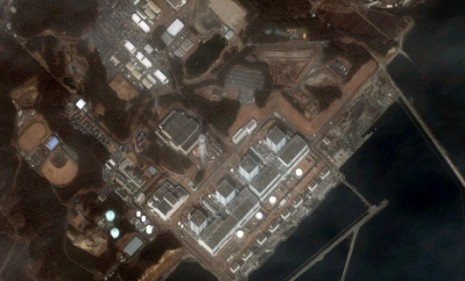Japan meltdown threat: Are nuclear plants too dangerous?
Even Japan's world-class experts are struggling to contain a total meltdown after a catastrophic earthquake and tsunami. Is it time to reconsider nuclear power?

A free daily email with the biggest news stories of the day – and the best features from TheWeek.com
You are now subscribed
Your newsletter sign-up was successful
Japan is racing to head off a nuclear catastrophe in the wake of Friday's devastating 8.9-magnitude earthquake and subsequent tsunami. At least two reactors at the Fukushima Daiichi Nuclear Power Station are at risk of full meltdown after being slammed by the tsunami. More than 200,000 residents within a 12-mile radius have been evacuated, and will have to stay away for the foreseeable future. The plant will have to vent radioactive steam for months, or even years. If even nuclear-sensitive, disaster-ready Japan is vulnerable to such a catastrophe, is anywhere safe for nuclear power? (See an explosion at Fukushima)
Only "fools" think we're safe from meltdowns: As Japan deals with its radioactive "human tragedy," the rest of us should worry about the "future meltdowns at nuclear ticking time bombs" around the world, says Michael Collins at The Agonist. Energy companies and nuclear-friendly governments, including the Obama administration, say nuclear plants are necessary and safe, but as Japan shows, we're all "sitting ducks."
"Post-nuclear Japan, pre-disaster United States"
The Week
Escape your echo chamber. Get the facts behind the news, plus analysis from multiple perspectives.

Sign up for The Week's Free Newsletters
From our morning news briefing to a weekly Good News Newsletter, get the best of The Week delivered directly to your inbox.
From our morning news briefing to a weekly Good News Newsletter, get the best of The Week delivered directly to your inbox.
No source of power is 100 percent safe: Of course, nuclear power does carry risks, says Matthew Yglesias at ThinkProgress. But you don't have to think back very far to see that coal mining and oil drilling aren't exactly "risk-free alternatives." Sure, conservation and renewable energy are safer, but "I don't see any particular reason" why the worries surrounding nuclear power are "more pressing than concerns around the fossil fuels that provide the majority of our energy."
"Two cheers for nuclear safety"
But why risk it? Japan turned to nuclear power to escape its dependence on foreign oil, but there's no reason today why we can't "replace hydrocarbons with renewable energy," says Juan Cole at Informed Comment. Portugal gets 45 percent of its power from renewable sources, and even power-hungry Germany has 17 percent green energy. Japan is just a reminder that "nuclear power plants are inherently unsafe," and we should stop investing in this "dead end" power source.
"Japan nuclear threat, Libya oil crisis, highlight need for renewable energy"
A free daily email with the biggest news stories of the day – and the best features from TheWeek.com
-
 The Week contest: AI bellyaching
The Week contest: AI bellyachingPuzzles and Quizzes
-
 Political cartoons for February 18
Political cartoons for February 18Cartoons Wednesday’s political cartoons include the DOW, human replacement, and more
-
 The best music tours to book in 2026
The best music tours to book in 2026The Week Recommends Must-see live shows to catch this year from Lily Allen to Florence + The Machine